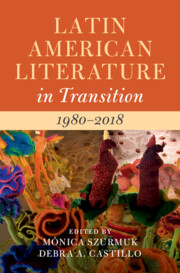Book contents
- Latin American Literature in Transition 1980–2018
- Latin American Literature in Transition
- Latin American Literature in Transition 1980–2018
- Copyright page
- Contents
- Contributors
- Acknowledgments
- Introduction
- Part I Security
- Chapter 1 Geological Writings
- Chapter 2 Literature, Trauma, and Human Rights
- Chapter 3 Literatura de Hijos in Post-Dictatorship South America
- Chapter 4 Mexican Narconarratives after Narcos
- Part II New Genres
- Part III Mobilities
- Part IV Positionalities
- Part V Latin American Literature in Global Markets
- Index
- References
Chapter 2 - Literature, Trauma, and Human Rights
from Part I - Security
Published online by Cambridge University Press: 24 November 2022
- Latin American Literature in Transition 1980–2018
- Latin American Literature in Transition
- Latin American Literature in Transition 1980–2018
- Copyright page
- Contents
- Contributors
- Acknowledgments
- Introduction
- Part I Security
- Chapter 1 Geological Writings
- Chapter 2 Literature, Trauma, and Human Rights
- Chapter 3 Literatura de Hijos in Post-Dictatorship South America
- Chapter 4 Mexican Narconarratives after Narcos
- Part II New Genres
- Part III Mobilities
- Part IV Positionalities
- Part V Latin American Literature in Global Markets
- Index
- References
Summary
This chapter underscores the role that literature played not only in articulating the demands for justice that accompanied human rights struggles after the military dictatorships in Latin America in the 1970s and 1980s but also in offering a space for the reconstruction of narrative memory and the exploration (and reinterpretation) of the traumatic events of the past. As neoliberalism was imposed with mass killings, clandestine detention, enforced disappearance, torture, and rape, many literary narratives gave visibility to criminal and clandestine illegal practices and created alternative archives, in those cases in which the official ones had been erased. Latin American literature became one of the most privileged spaces for the construction of memory in post-dictatorships. Linked to human rights struggles and processes of democratization, different aesthetics of memory expanded the notion of memory coming from legal and judicial discussions, as well as from the approaches of the social sciences. On the one hand, the literary texts I will discuss in this chapter exposed illegal forms of violence, responding to the urgency of making them public. On the other hand, they delved into different ways of representing traumatic experiences as well as the borders, silences, and fragments of the recollections of the past. In this chapter, I will approach the aesthetics of memory from different angles, from the emphasis on the crimes to the silence and forgetting, to the analysis of the relationship between the body and affect, or the long-lasting effects of violence and trauma in the present, and even the difficulties of remembering and of making sense of painful experiences.
- Type
- Chapter
- Information
- Latin American Literature in Transition 1980–2018 , pp. 30 - 46Publisher: Cambridge University PressPrint publication year: 2022



